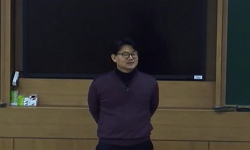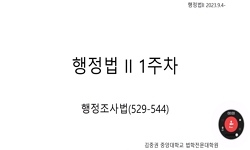Twenty-six years after the enactment of the Korean Administrative Procedure Act in 1996, the Act has been substantially revised. In the course of enacting and amending the Act, a series of legal transfers were made. A comprehensive analysis of these t...
http://chineseinput.net/에서 pinyin(병음)방식으로 중국어를 변환할 수 있습니다.
변환된 중국어를 복사하여 사용하시면 됩니다.
- 中文 을 입력하시려면 zhongwen을 입력하시고 space를누르시면됩니다.
- 北京 을 입력하시려면 beijing을 입력하시고 space를 누르시면 됩니다.

The Formation and Development of the Korean Administrative Procedure Act: From the Perspective of Legal Transfer
한글로보기부가정보
다국어 초록 (Multilingual Abstract)
Twenty-six years after the enactment of the Korean Administrative Procedure Act in 1996, the Act has been substantially revised. In the course of enacting and amending the Act, a series of legal transfers were made. A comprehensive analysis of these transfers provides invaluable insights into the transfer of legislation. It is crucial to differentiate between the impact of foreign legislation on the 1996 enactment and its influence on the 2022 revision, as these are two distinct phenomena. The process preceding the enactment of the Administrative Procedure Act in 1996 involved the transfer of legal systems from Germany, the United States, and Japan. Nevertheless, the selection of a foreign legal system and legal theory was ultimately contingent upon the requirements of the legislative leadership group. A variety of stakeholders, including academics, civil society organisations and bureaucratic groups, held disparate views on the optimal foreign legal system and legal theory to adopt in the development of the Administrative Procedure Act. This is because the perception of the problem by each group ultimately determined which countryʼs legal system and legal theory should be adopted. Ultimately, the opinions of the bureaucratic groups with the most at stake were the ones that prevailed in the legislative process. However, the 2022 revision marked a significant shift from the approach taken in 1996, with Korean case law assuming a more prominent role in the development of the law. In the 2022 legal transfer, foreign legal systems and legal theories played a more nominal role in justifying the legislation. Meanwhile, the actual content of thelegislation reflected the intentions of the legislative leadership group and the development of case law in accordance with Koreaʼs own driving forces. Nevertheless, foreign legal systems and theories will continue to serve as a pivotal point of reference for Korean legislation, as well as a crucial foundation for the legitimisation of the legislation.
동일학술지(권/호) 다른 논문
-
- 한국법제연구원
- 권미셸
- 2024
- KCI등재
-
- 한국법제연구원
- Alexander Graser
- 2024
- KCI등재
-
On the Shoulder of Giants -Vietnam’s Emerging Personal Data Protection Framework and the GDPR
- 한국법제연구원
- Tien-Duc Nguyen
- 2024
- KCI등재
-
The Equitization of State-owned Enterprises in Vietnam: A Legal Analysis of Foreign Investment
- 한국법제연구원
- Chu Thi Thanh An
- 2024
- KCI등재




 KCI
KCI







